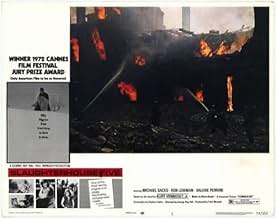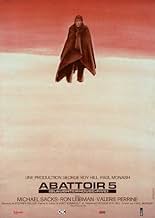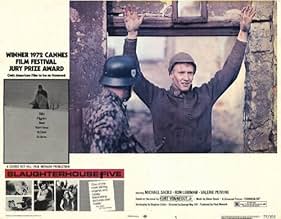IMDb-BEWERTUNG
6,8/10
14.407
IHRE BEWERTUNG
Ein Mann namens Billy Pilgrim erzählt die Geschichte, wie er in der Zeit hängen blieb und von Außerirdischen entführt wurde.Ein Mann namens Billy Pilgrim erzählt die Geschichte, wie er in der Zeit hängen blieb und von Außerirdischen entführt wurde.Ein Mann namens Billy Pilgrim erzählt die Geschichte, wie er in der Zeit hängen blieb und von Außerirdischen entführt wurde.
- Regie
- Drehbuch
- Hauptbesetzung
- Auszeichnungen
- 3 Gewinne & 4 Nominierungen insgesamt
Friedrich von Ledebur
- German Leader
- (as Friedrich Ledebur)
Ekkehardt Belle
- Young German Guard
- (as Nick Belle)
Empfohlene Bewertungen
It makes an eloquent statement about how traumatic moments in our life stay with us as if it 'just happened yesterday'. What makes this film so appealing is how it depicts what would happen if you could jump around your entire life. When the future influences the past, it takes on a great significance. Billy Pilgrim is a humdrum Optometrist who nevertheless has an exciting life, surviving the bombing of Dresden in WW2, living through a plane crash, and being transported to another planet. Yet he maintains to be humble. As we follow Billy's life, the portrait of mediocre America is a touching contrast to the other moments that are frightening. He knows how he will die, and in the process becomes unafraid to live life to it's fullest. The inhabitants of the planet Tralfamador (??) say it is best to concentrate on the good moments in your life, and not so much on the bad. But they are still there, and you cannot erase that moment of your life. In essence, the true moral of this film is to accept all that has happened in your life. For if you don't, you deny the validity of your existence. When Billy finally writes about his adventures, others have a chance to learn about the world and themselves that would've otherwise been denied.
Technically, the film uses the moments where Billy jumps in time as meaningful transitions. It interweaves lessons learned from one part of his life and applies it to the present moment (whenever that is). The film's real treasures are the supporting characters that surround Billy. It also vividly transports you to WW2, a semi-autobiographical account of Kurt Vonnegut's real life experiences in Dresden. The film is filled with anecdotes that present the film's other main theme, that life is indeed ironic.
I was deeply touched by this film, with it's ability to whisk you from scenes of horror to amusing 'Kodak moments'. The music poignantly represents these transitions, and helps to carry the film. In the end, you can accept his death, by having lived his life.
Technically, the film uses the moments where Billy jumps in time as meaningful transitions. It interweaves lessons learned from one part of his life and applies it to the present moment (whenever that is). The film's real treasures are the supporting characters that surround Billy. It also vividly transports you to WW2, a semi-autobiographical account of Kurt Vonnegut's real life experiences in Dresden. The film is filled with anecdotes that present the film's other main theme, that life is indeed ironic.
I was deeply touched by this film, with it's ability to whisk you from scenes of horror to amusing 'Kodak moments'. The music poignantly represents these transitions, and helps to carry the film. In the end, you can accept his death, by having lived his life.
"Slaughterhouse 5" is perhaps the best book-film translation I've ever seen.
Let me safely say that Kurt Vonneguts 'Slaughterhouse 5' is my favourite book ever. It is incredibly funny and moving above any book I've ever read. But it is also a very complex and philosophical story with many deeply rooted undertones. As such, I strongly urge people to READ THE BOOK before you see this movie. A great many points are left unexplained to the viewer, assuming they have read Vonneguts version. As I read it beforehand, the movie didn't insult my intelligence by putting Vonneguts ideas in plain view. Instead, it relies faithfully on the viewers interpretations, not unlike the book.
Once again, unless you have a mind open like a 7-11, READ THE BOOK. Take my advice, and be immersed in the greatest story of the 20th century.
Let me safely say that Kurt Vonneguts 'Slaughterhouse 5' is my favourite book ever. It is incredibly funny and moving above any book I've ever read. But it is also a very complex and philosophical story with many deeply rooted undertones. As such, I strongly urge people to READ THE BOOK before you see this movie. A great many points are left unexplained to the viewer, assuming they have read Vonneguts version. As I read it beforehand, the movie didn't insult my intelligence by putting Vonneguts ideas in plain view. Instead, it relies faithfully on the viewers interpretations, not unlike the book.
Once again, unless you have a mind open like a 7-11, READ THE BOOK. Take my advice, and be immersed in the greatest story of the 20th century.
10herbqedi
The realization of this glimpse into the mind's eye of a man unstuck in time is brilliant to behold. Yes, the book is a brilliant work in its own right, and open to interpretation, as a truly complex work must be. The movie is not the book. It is Hill's interpretation of the book, and a brilliant and viable one it is.
Hill won the best Director Oscar the next year with "The Sting". He later filmed the similarly unfilmable "World According To Garp" and also did a brilliant job with it, partially by letting go of John Irving's more depressing side. Other notable credits include Butch Cassidy... and The Great Waldo Pepper.
Michael Sacks, in his first movie, and only starring role at the tender age of 24, is completely convincing and natural. He is equally effective, compelling, and believable at the six distinct stages of Pilgrim's life memorialized herein. If he weren't up to the six-in-one role, the film wouldn't work, but he is, and it does. (I wonder why he has no other major credits, and ceased acting altogether in 1984. If anyone knows, please e-mail me.)
Valerie Perrine is fine as Montana Wildhack. The other characters are all played for maximum irony and effect, and the cast delivers beautifully, without exception. Eugene Roche is the epitome of kindness as Edgar Derby, the yin, to Ron Liebman's yang, a twisted ball of anger named Paul Lazaro. John Dehner is brilliant as a war-hawk professor upset at the Vietnam protesters. His character would be as appropriate amidst today's global conflagration as it was in 1966. Lucille Benson, Kevin Conway, Sorrell Booke, Holly Near, Richard Schaal, and Perry King are the more familiar names in a uniformly excellent cast, including the German actors.
The musical score is also perfect, both in tone and substance. Vonnegut is a master of superimposing satire over irony over futility. The movie does a marvelous job of blending these contrasts and making its audience feel enriched. The music underscores all of these contrasts. The cinematography also is magnificent.
Searching desperately for something to say to show that the movie cannot be 100% perfect, the only thing I can come up with is that the pacing of the movie drags slightly when the soldiers leave the first camp for Dresdner until their new Kommandant gives his "welcoming" speech. It might have played better with about three minutes cut from that sequence. So what?
I recently saw Slaughterhouse Five for the fifth time in 27 years since I originally saw it at my college campus -- this time on DVD. I never fail to catch something new, and I never fail to enjoy it all the more.
Given how many 70's movies have failed miserably to withstand the test of time, Slaughterhouse Five is a true treat to be savored.
Hill won the best Director Oscar the next year with "The Sting". He later filmed the similarly unfilmable "World According To Garp" and also did a brilliant job with it, partially by letting go of John Irving's more depressing side. Other notable credits include Butch Cassidy... and The Great Waldo Pepper.
Michael Sacks, in his first movie, and only starring role at the tender age of 24, is completely convincing and natural. He is equally effective, compelling, and believable at the six distinct stages of Pilgrim's life memorialized herein. If he weren't up to the six-in-one role, the film wouldn't work, but he is, and it does. (I wonder why he has no other major credits, and ceased acting altogether in 1984. If anyone knows, please e-mail me.)
Valerie Perrine is fine as Montana Wildhack. The other characters are all played for maximum irony and effect, and the cast delivers beautifully, without exception. Eugene Roche is the epitome of kindness as Edgar Derby, the yin, to Ron Liebman's yang, a twisted ball of anger named Paul Lazaro. John Dehner is brilliant as a war-hawk professor upset at the Vietnam protesters. His character would be as appropriate amidst today's global conflagration as it was in 1966. Lucille Benson, Kevin Conway, Sorrell Booke, Holly Near, Richard Schaal, and Perry King are the more familiar names in a uniformly excellent cast, including the German actors.
The musical score is also perfect, both in tone and substance. Vonnegut is a master of superimposing satire over irony over futility. The movie does a marvelous job of blending these contrasts and making its audience feel enriched. The music underscores all of these contrasts. The cinematography also is magnificent.
Searching desperately for something to say to show that the movie cannot be 100% perfect, the only thing I can come up with is that the pacing of the movie drags slightly when the soldiers leave the first camp for Dresdner until their new Kommandant gives his "welcoming" speech. It might have played better with about three minutes cut from that sequence. So what?
I recently saw Slaughterhouse Five for the fifth time in 27 years since I originally saw it at my college campus -- this time on DVD. I never fail to catch something new, and I never fail to enjoy it all the more.
Given how many 70's movies have failed miserably to withstand the test of time, Slaughterhouse Five is a true treat to be savored.
There seems always to be something exhilaratingly depressing about Vonnegut's work. It's as if our lives were slowly coming apart at the seams. There always seems to be an element of tragic waste in his characters' lives, and never is the feeling more evident than in the book and film of "Slaugherhouse-Five." It's not surprising to learn that Vonnegut really did live through the firebombing of Dresden during World War II.
If there's a weak element of the film, it's the bombing itself. By never letting the audience see outside the bomb shelter Pilgrim was in (and if so, not making it vivid enough for me to remember it), the horror and sheer magnitude of the event is downplayed. Two hundred thousand people died in the destruction of one of the greatest, most majestic cities in all of Europe, and all we're given is a shaking camera. Those who've read the book know that the trajedy was conveyed all to well by Vonnegut's skillful, near-photographic descriptions of the event and its aftermath. Very little of it made it to the screen.
Aside from that, George Roy Hill does an excellent job of communicating the existential dread of what must have been thought to be an unfilmable novel. The fate of Pilgrim's wife through her reckless driving could have come off as tasteless black comedy, but any cheap laughs are thankfully avoided, and the sequence is as shocking as it is heartbreaking. The really far-out parts of the novel (the four-dimensional aliens, Vonnegut's conception of the future and the end of the universe) are done with complete seriousness; another director might have had a condescending approach to the material, and killed the magic. The novel, by itself, is one of the best I've ever read -- it gleefully trashes the rules of standard novel-making, narration, and continuity, and manages to tell a real whale of a tale (there's a lot of weird stuff to swallow in it.) When I saw Hill credited as director, I moaned in agony, recalling the headaches that were induced by his smug, syrupy box office smashes "Butch Cassidy and the Sundance Kid" and "The Sting." After those two, I gave up all hope in Hill, the same way I did with Richard Lester after "Petulia" and "Help!" By the end of the movie, however, I ate my words. It's a beautiful, thought-provoking, and enchanting film, and does justice to a fine novel.
If there's a weak element of the film, it's the bombing itself. By never letting the audience see outside the bomb shelter Pilgrim was in (and if so, not making it vivid enough for me to remember it), the horror and sheer magnitude of the event is downplayed. Two hundred thousand people died in the destruction of one of the greatest, most majestic cities in all of Europe, and all we're given is a shaking camera. Those who've read the book know that the trajedy was conveyed all to well by Vonnegut's skillful, near-photographic descriptions of the event and its aftermath. Very little of it made it to the screen.
Aside from that, George Roy Hill does an excellent job of communicating the existential dread of what must have been thought to be an unfilmable novel. The fate of Pilgrim's wife through her reckless driving could have come off as tasteless black comedy, but any cheap laughs are thankfully avoided, and the sequence is as shocking as it is heartbreaking. The really far-out parts of the novel (the four-dimensional aliens, Vonnegut's conception of the future and the end of the universe) are done with complete seriousness; another director might have had a condescending approach to the material, and killed the magic. The novel, by itself, is one of the best I've ever read -- it gleefully trashes the rules of standard novel-making, narration, and continuity, and manages to tell a real whale of a tale (there's a lot of weird stuff to swallow in it.) When I saw Hill credited as director, I moaned in agony, recalling the headaches that were induced by his smug, syrupy box office smashes "Butch Cassidy and the Sundance Kid" and "The Sting." After those two, I gave up all hope in Hill, the same way I did with Richard Lester after "Petulia" and "Help!" By the end of the movie, however, I ate my words. It's a beautiful, thought-provoking, and enchanting film, and does justice to a fine novel.
This is a very clever, thoughtful, well made movie. It succeeded in doing what I thought was nearly impossible, i.e. to put this amazing book on film. There are one or two small points that keep me from giving this picture anything higher than a 7, the main one being Ron Liebman playing the Paul Lazzaro role - highly irritating. Other than that, a brave and imaginative, clever, witty film that I would heartily recommend to anyone.
Wusstest du schon
- WissenswertesAlthough Kurt Vonnegut Jr.'s renowned refrain, "And so it goes", appears over 100 times in the novel, it it is not uttered even once in this film.
- PatzerWhen Billy Pilgrim is asked by the American soldiers, "Where's your rifle?", he replies that he doesn't have one because he's a chaplain's assistant. However, in the United States Army, the primary duty of the chaplain's assistant in a combat zone is to protect the chaplain, so all chaplain's assistants must carry rifles. Because Chaplains are considered ministers in uniform they are forbidden from carrying weapons even when in combat zone.
- Zitate
Billy Pilgrim: [in his sleep] You guys go on without me. I'll be alright.
Prof. Rumfoord: All he does in his sleep is quit, surrender, and apologize. I could carve a better man out of a banana.
- Crazy CreditsThe Universal logo does not appear on this film.
- VerbindungenEdited into The Clock (2010)
- SoundtracksConcerto No. 5 for Harpsichord in F minor, BWV 1056 - 2nd movement 'Largo'
Written by Johann Sebastian Bach (as J.S. Bach)
Performed by Glenn Gould, Piano
Columbia Symphony Orchestra
Vladimir Goldschmann, Conductor
Top-Auswahl
Melde dich zum Bewerten an und greife auf die Watchlist für personalisierte Empfehlungen zu.
- How long is Slaughterhouse-Five?Powered by Alexa
Details
- Erscheinungsdatum
- Herkunftsland
- Offizielle Standorte
- Sprachen
- Auch bekannt als
- Slaughterhouse-Five
- Drehorte
- Prag, Tschechische Republik(as Dresden)
- Produktionsfirma
- Weitere beteiligte Unternehmen bei IMDbPro anzeigen
Box Office
- Budget
- 3.200.000 $ (geschätzt)
- Laufzeit1 Stunde 44 Minuten
- Sound-Mix
- Seitenverhältnis
- 1.85 : 1
Zu dieser Seite beitragen
Bearbeitung vorschlagen oder fehlenden Inhalt hinzufügen






































